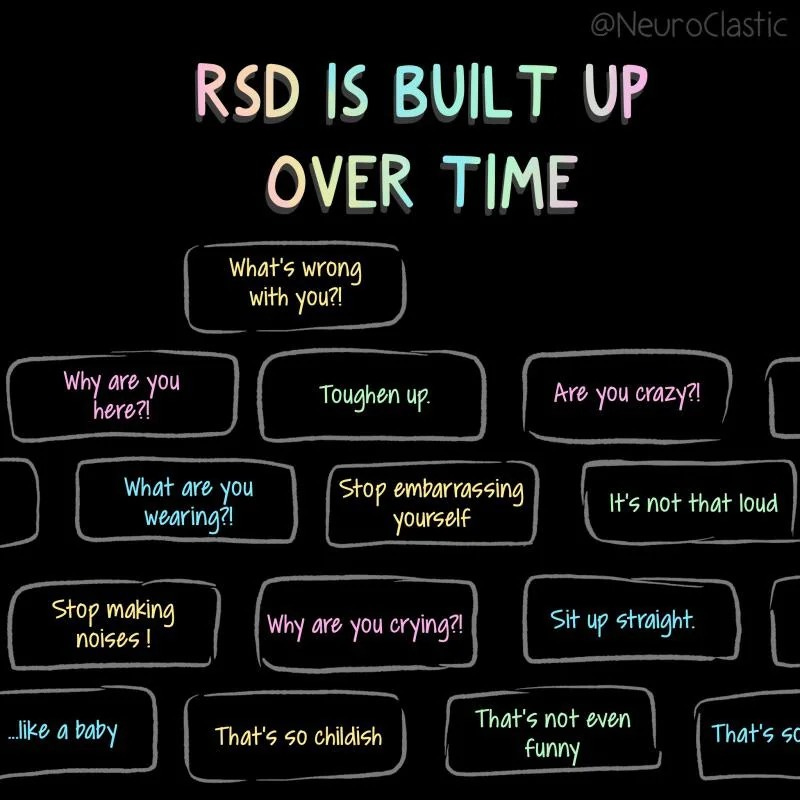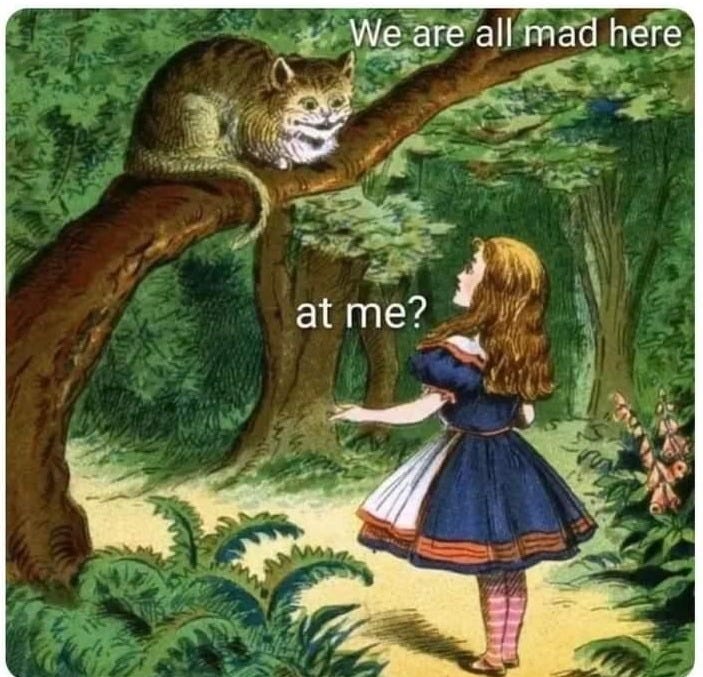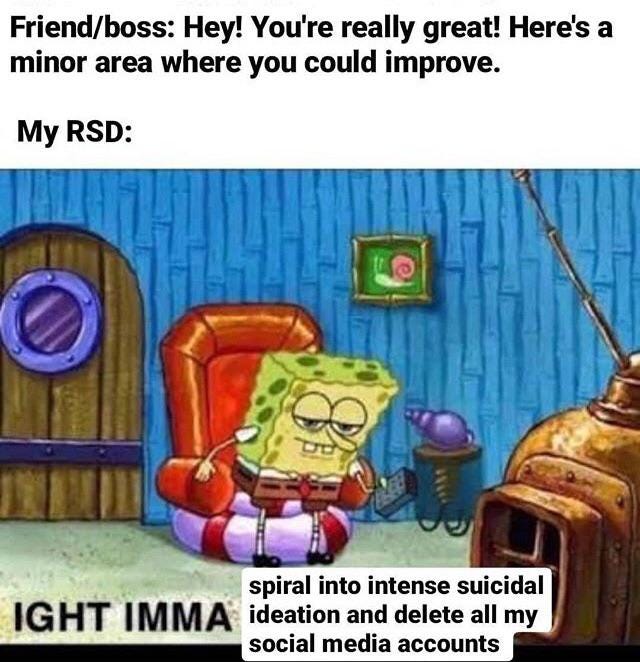Rejection Sensitive Dysphoria (RSD) & How to Manage It
99% of people with ADHD experience RSD, and many find it to be the worst aspect of our condition. Much worse than The Disappearing Phone. It causes unbearable darkness & shame that blights our lives.
What is Rejection Sensitive Dysphoria?
RSD is an intensely unpleasant and debilitating emotional sensitivity that many people with ADHD experience when we feel we have been rejected, criticised or not meeting expectations.
Symptoms of RSD include overwhelming sadness, at times to the point of suicidal ideation, extreme anxiety, intense feelings of worthlessness, self doubt and loneliness. During an RSD episode, a person often engages in bullying self-talk. My RSD monster loves to tell me I have no friends, everyone secretly hates me and that I will die on old lonely lady.
RSD negatively influences almost all aspects our lives. RSD can makes it difficult for us to have secure healthy relationships with others and to make decisions that are good for us. Debilitated with shame and anxiety, we often disengage from self nurturing activities and engage in self destructive behaviour.
Many of us use destructive coping strategies, such as avoidance and seeking validation and reassurance from others. We engage in people pleasing, fawning, hypervigilance for signs of rejection in others which can come across as paranoia. We often turn to alcohol and substance abuse to reduce our anxiety and other difficult feelings and to calm our anxieties and feelings of shame.
The RSD Monster drives future behaviour and decisions. It steers us towards experiences where we feel safe, swerving us away from situations that may trigger an episode, such as social gatherings or job promotions.
What does an episode of Rejection Dysphoria feel like? 😖
Half asleep, my hand feels for the phone. Mindlessly scrolling my newsfeed, in that foggy space between sleep and awake, when suddenly, my eyes are drawn to a series of bright, lively pictures on Facebook.
A party. Looks fun!
Wait, are those my colleagues all together, dressed up and laughing and smiling for the camera..?
I didn’t know about this party…
Oh!
A sharp icy jolt of shame plunges through me as I realise they were all at a party I wasn’t invited to.
Immediately, more shame and anxiety surge, pushing out the drowsy comfort I was enjoying just moments before, and hot tears sting my eyes. The RSD monster sneers, “Of course you weren’t invited, idiot. Everyone hates you. You’ve always been alone, and you always will be.”
I feel so alone, my tears blur my vision.
I imagine that I am an astronaut lost in the vast, silent expanse of space.
I’ve always been alone, and I always will be.
During an episode, our body goes into flight or flight. Adrenaline causes our heart to race, our temperature to rise and our rational brain shuts down. It can be very difficult to persuade us anything contrary to whatever our RSD monster is telling us.
It can take a while for an RSD episode to subside. It is difficult to talk to a friend or family member, as it's embarrassing having such an intense reaction. How do we say “You only left one x at the end of your text, why do you hate me” in a mentally stable way? 🥲
It’s complicated because we may well know intellectually that our reactions are disproportionate, but tell that to our overactive hyper dramatic nervous system pumping out adrenaline like we’re in a gladiator ring with a hungry bear!
RSD Triggers
RSD can be triggered by so many things that might seem insignificant or silly to a neurotypical person. A sense that someone's tone is off, not receiving a reply to texts (even though we often forget to text back, what hypocrites we are 😆), no emojis in texts, not being invited to a party and being picked last for teams are just some examples of triggers that can lead us to a full blown RSD episode.
Causes of RSD 🧠
Difficulties with emotional regulation and sensitivity
Brain differences The amygdala, responsible for processing emotions, may be overactive in RSD, leading to heightened responses to perceived rejection. Additionally, hypersensitivity in the brain's reward system may cause people with RSD to be more sensitive to social cues like rejection or criticism. Lower dopamine levels in areas like the striatum, which is key to reward processing, may also contribute to this heightened sensitivity.
Trauma: Childhood criticism and rejection
Oh I didn’t have trauma, I was never beaten up or badly emotionally abused
Are you sure?
Trauma isn’t only a result of Very Bad Things happening…
Constant daily rejection, criticism and reminders that we are not good enough send us the message that we are inadequate, we are ‘other’ and we are alone. The more we hear it, the more this message is compounded. After some time, we internalise this. And eventually, we may notice that this internalised critic resides in our mind permanently, taunting us and tormenting us at any slight perceived criticism…… The RSD Monster.

Every person in my IRL neurodivergent community who I have spoken with about their RSD, shares that they experienced childhood rejection and criticism. And conversely, the few people who say that they do not have RSD, also relay a trauma free childhood of acceptance and love.
I have had so many discussions with members about the endless the reasons that an ADHD child or young adult would receive criticism and rejection, compared to neurotypicals.
Think about it..💭
Criticism from teachers
Being late; difficulties with focussing in class, untidy appearance; restlessness and fidgeting; blurting out answers; auditory processing difficulties; low boredom threshold; difficulties with regulating attention affecting their understanding of work and tasks; fluctuating energy levels; strong sense of justice that so many ADHD people have getting them in to trouble when they challenge perceived unfairness…
Criticism from parents
Being late; bad grades at school; mood swings; untidy appearance; substance abuse; ‘inappropriate’ hyperfixations; difficulties with emotion regulation…
Rejection from friends
Rejection due to ‘weird’ behaviour, especially when feeling ‘hyper’ and impulse control is lower than usual; inability to fit in / mask effectively; dress sense (many ADHD people enjoy colourful clothes, which can be met with disapproval from peers); difficulties with emotion regulation…
Helpful Coping strategies for Rejection Sensitive Dysphoria ✅
I’ve suffered so badly with RSD my whole life. Learning about RSD and reducing it to a symptom or a brain processing error took away some of the mysticism and power of RSD. I can’t say that I don’t experience RSD anymore, I do, but the intensity of my episodes of have reduced in intensity and frequency. Here are some coping strategies that I have learned via books, experience and SO much therapy
Be aware 👀: It is important to recognise when you are experiencing RSD. Identifying the triggers and recognizing the emotional response is the first step towards managing it.
Remember, this is a brain glitch 🤯: It helps me to know ‘the error’ lies within my own processing systems. My sensitivities and difficulties with emotion regulation are showing me an exaggerated and untrue perspective that probably does not match reality. Repeat to self ‘This feeling of being completely hated, ostracised and alone is a processing error and not real’.
Be kind to yourself 💓: Go against your instinct of wanting to be self destructive and be kind to yourself! Put the vodka bottle away. Make a lovely bubble bath, go for a walk, watch something funny or your favourite comfort show. Repeat positive affirmations and do a self compassion meditation!! Meta meditations really work. Even if you don’t feel self compassionate, you are not being self destructive and you are breaking the pattern. One therapist advised me to make a self care box, filled with thing that make me happy. In went joke books, a face mask and sweary affirmation cards.
You are not alone 🫶: It feels kind of mean to gain comfort from knowing that other people are also suffering, but it really helps to know you are not alone
Find your tribe! 🥰: Surround yourself by kind people who understand and support you, such as fellow neurodivergents and allies- explain when you’re calm that you suffer from RSD, and what they can do to help. My friends know I have it and that it can be triggered by something as benign as not replying to a text message or even not putting emojis at the end of their text as they usually do. True story, that triggered an episode fore me on more than one occasion 🤦♀️.
In our neurodivergent friendship group, we are consciously shame free in our interactions. We therefore feel safe to be transparent when we're experiencing an episode and we try to avoid triggering each other. It’s helps so much to discuss our RSD openly without any judgment. Over time, not only have my episodes decreased in number, but they’ve also become less intense when they do occur. Read what I wrote on finding your neurodivergent tribe.
Neurodivergent in London, England and looking for friends? Well, look no more! 👀 Apply to join the LNFG here 🐿️👽
Are you in the UK and looking to get an ADHD diagnosis? Getting one in the UK is ridiculous -insane waiting times and difficult doctors if NHS, crazy money if private.
I’ve partnered with a service called Mentalwell, who have given me a 15% discount to share
All assessments with Mentalwell are done by psychiatrists who are experts in ADHD (not nurses or pharmacists), they're fully remote, and start at £590 (before the discount below), which is a zillion times cheaper than what I paid !!
You don’t have to get a referral from your GP, no waitlists either, and you’re fully supported. You can start with an assessment only or go for a full care package.
Assessment starts at £590 and next day assessments available
Here is the code for 15% off: JEANIE15




Wow 😮 I think you need to include people who have psychosis, schizophrenia and schizoaffective disorder as well when you discuss this particular dysphoria, because it’s really common in people with this condition and it triggers full episodes frequently. On this platform I have only found one person so far who writes about schizophrenia from the perspective of having it (The Manic Messiah) as well as a couple of lovely people who are caring for family members (Lala Indie Maker and David McGee). This is an interesting crossover topic for me. I’ve always been a bit spaced out from a young age, a big reader but a bit slow to catch on socially, a bit like there was a pane of glass between me and everyone else is how I would describe it, a mild indication that my perception was neurodivergent perhaps, but in a way unique to schizophrenics. I’m proud to be one, by the way, even if I am the first person ever to say it 🤗
Oh yes, the dreaded RSD! I wrote about this and 'Trash Can Shame' a little while ago, those are my most difficult ADHD traits to deal with 😬